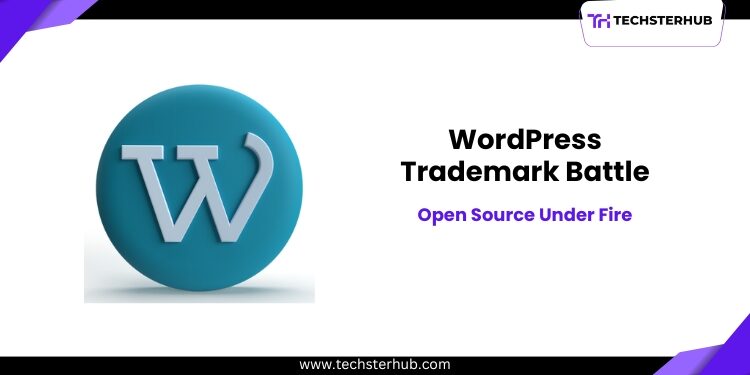Few open-source software projects have achieved the level of impact that WordPress has created. WordPress stands as the web’s leading content management system because it supports millions of personal blogs as well as major corporate websites worldwide. The open-source framework of WordPress allowed developers to freely contribute and create innovations that propelled its success. The WordPress project has become the focal point of an escalating debate about trademarks and open-source software limitations.
This article examines the current dispute over WordPress trademarks and explores its potential impact on the open-source community and the project’s future.
What is WordPress?
A clear understanding of WordPress becomes essential before we explore its trademark dispute. WordPress represents an open-source system that enables people to create and control websites. Matt Mullenweg and Mike Little created WordPress in 2003 which now serves as the leading global CMS platform for more than 40% of all websites.
WordPress remains open-source which enables free usage along with public access to its source code for any modifications and enhancements. WordPress’s open-source model has resulted in a large developer community that creates plugins and themes along with other extensions to improve its functionality. Its open-source model creates difficulties particularly around issues of trademarks as well as branding and commercial interests.
What is the Trademark Dispute About?
The central issue in the WordPress trademark dispute concerns ownership of the WordPress name and logo along with their usage guidelines inside the open-source community. The WordPress Foundation leads the WordPress project which holds the trademark rights for both the name and logo of WordPress. The ownership of the WordPress name and logo trademarks provides the WordPress project with legal authority to regulate brand usage concerning product, service, and business associations.
Recent years saw trademark concerns escalate when certain companies and individuals began using the “WordPress” name and logo in manners that the WordPress Foundation found inappropriate or misleading. The Foundation worries that unauthorized commercial use of the name and logo may lead to consumer confusion and weaken the brand’s identity.
Some businesses began to market products and services under the “WordPress” name without receiving official endorsement from the WordPress Foundation. The lack of clear distinctions caused marketplace confusion and concerns that consumers believed these products received official approval from the WordPress team despite not being endorsed. The WordPress Foundation responded by implementing more rigorous trademark usage regulations.
Key Issues in the Dispute
The trademark dispute surrounding WordPress encompasses numerous key issues that highlight the tension between open-source software and commercial interests.
- Trademark Ownership and Control: As the legal owner of WordPress trademarks the WordPress Foundation holds the right to enforce these marks and stop unauthorized use. The trademark enforcement by the WordPress Foundation has created tension with developers and companies who think open-source software should not have trademark restrictions. Several people believe that trademark control of the name and logo contradicts open-source software principles which prioritize collaborative freedom.
- Commercial Use of WordPress: Businesses including web hosting firms, theme developers and plugin manufacturers market their offerings by using the WordPress brand. The WordPress Foundation previously permitted usage of the name but now takes legal action against companies that use it without proper authorization. The topic of commercial interests within the WordPress ecosystem has become a point of contention regarding the extent of the Foundation’s power to regulate brand usage.
- Confusion and Misleading Branding: The WordPress Foundation fears that unauthorized usage of their name will trick users into believing that non-endorsed products or services are officially affiliated with WordPress. Independent developers who create plugins or themes with the WordPress name may draw in users who believe these products are official WordPress components. Unauthorized branding of the WordPress name can harm the project’s reputation and lead to marketplace confusion.
- Community vs. Commercialization: The trademark dispute primarily stems from the conflicting interests between WordPress’s open-source community development and the growing commercial presence within its ecosystem. The expansion of WordPress has pulled more businesses toward it because they believe there are profitable opportunities in providing products and services that relate to the platform. A group of people advocate for more freedom for commercial entities to utilize the WordPress name yet their opponents claim this threatens the open-source development principles and risks corporate dominance of the project.
How Has the WordPress Foundation Responded?
To shield its brand from trademark issues the WordPress Foundation has adopted a proactive strategy that makes sure its trademarks represent WordPress project values. The Foundation has implemented multiple important measures.
- Trademark Enforcement Guidelines: The WordPress Foundation has defined specific rules for the acceptable usage of the WordPress name and logo. The purpose of these guidelines is to protect the WordPress brand integrity by stopping trademark misuse. Businesses and developers need to be cautious when using the WordPress name to avoid implying any official partnership or endorsement from the Foundation unless they have such a relationship.
- Legal Action Against Trademark Violations: The WordPress Foundation frequently pursues legal action to enforce its trademark rights against companies and individuals who misuse its marks. The WordPress Foundation sends cease-and-desist letters to businesses that improperly use the WordPress name contrary to its guidelines. The Foundation has initiated legal proceedings to safeguard its intellectual property rights.
- Emphasizing the Open-Source Nature of WordPress: The WordPress Foundation maintains its trademark enforcement while making it clear that WordPress is still an open-source project. The Foundation asserts that its trademark enforcement exists only to prevent misleading or confusing brand usage while allowing the WordPress platform to remain accessible.
Why Is This Issue Important?
The current dispute over WordPress trademarks extends beyond one project and affects the entire open-source software community. The fundamental principle of open-source software is that it allows unrestricted contributions and modifications by everyone. The expansion of projects like WordPress blurs the line between open-source software and commercial interests.
The WordPress Foundation faces difficulties in trademark enforcement that demonstrate the complex task of satisfying open-source community needs while dealing with commercialization pressures. Maintaining brand protection is crucial because it helps to sustain both trust and credibility.
The WordPress Foundation faces difficulties in trademark enforcement that demonstrate the complex task of satisfying open-source community needs while dealing with commercialization pressures. Maintaining brand protection is crucial because it helps to sustain both trust and credibility.
The resolution of this conflict may establish a guideline for other open-source initiatives encountering equivalent challenges when they expand and draw business attention.
The Bigger Picture: Open Source and Commercialization
The WordPress trademark issue is part of a larger trend in the tech world: the commercialization of open-source projects. Many open-source projects throughout their history have struggled to deal with increasing commercial interest while maintaining their foundational values. Certain projects have accepted business partnerships and sponsorships whereas others have rejected all forms of commercial involvement.
WordPress stands out because it has successfully maintained a harmony between open-source development and commercial business operations. WordPress stays free and open while businesses build successful operations around it by supplying services and developing themes and plugins. The influx of financial investment into the ecosystem demonstrates the need for the open-source community to develop new protective strategies that maintain its identity and safeguard core values from commercial influences that initially brought WordPress success.
Conclusion
The ongoing trademark conflict with WordPress demonstrates the difficulties of maintaining open-source principles alongside business interests. WordPress’s community leaders need to develop strategies that maintain brand integrity but also keep the platform open and free for everyone as the platform develops further. This dispute will affect not only WordPress but the entire open-source ecosystem because similar conflicts will emerge in the future.
WordPress will need to maintain its open-source principles while accommodating both community and business interests as it expands with new business possibilities. The decisions of the WordPress Foundation in dealing with trademark issues will determine the platform’s future path and establish a benchmark for other open-source projects facing similar trademark dilemmas.











